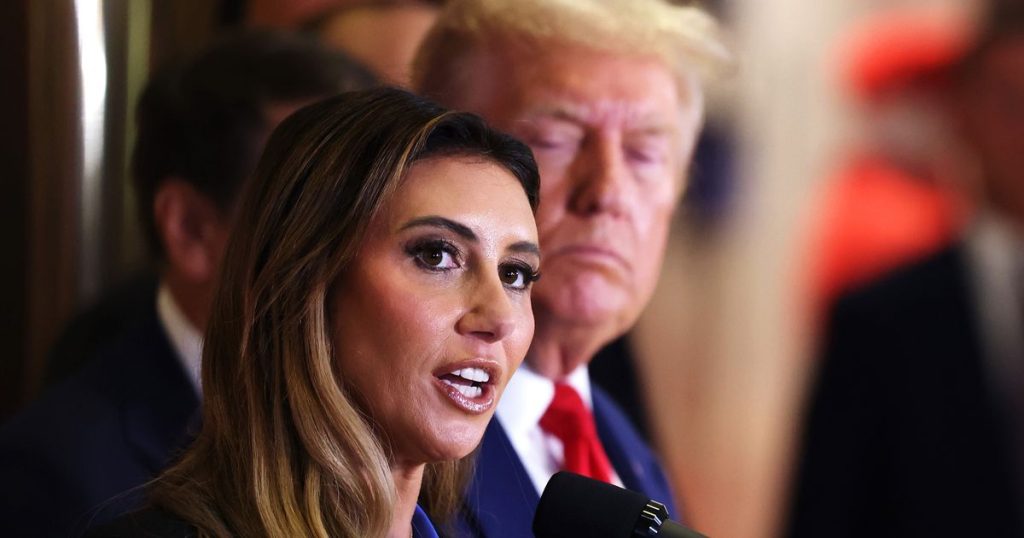White House counselor Alina Habba sparked both curiosity and skepticism with her recent comments about President Donald Trump’s Cabinet during a conversation with Fox News’ Sean Hannity. The discussion revolved around the backlash directed at Elon Musk, the world’s wealthiest individual, who has been leading a non-official initiative called the Department of Government Efficiency. This initiative, tasked by Trump, aims to streamline government operations. Habba defended Musk and the administration, arguing that critics fail to recognize the sacrifices made by high-profile figures who have joined Trump’s team. However, her claims have raised eyebrows, particularly given the unprecedented wealth of Trump’s second-term Cabinet, which reportedly boasts a collective wealth of $20 billion, not counting Musk’s staggering $400 billion fortune.
Habba’s remarks emphasized the idea that Trump’s administration is unique in its ability to attract successful billionaires who are willing to step away from their lucrative careers and personal lives to serve the nation. She highlighted the sacrifices these individuals have made, suggesting that their involvement is a testament to their commitment to making America “great again.” While Habba did not name specific individuals, her statement implied that these billionaires have put their businesses and personal interests on hold to contribute to the administration’s goals. Her defense of Musk and the Cabinet was an attempt to shift the narrative away from criticism and toward appreciation for their efforts.
However, critics were quick to challenge Habba’s assertions. Many questioned her claim that these billionaires have truly sacrificed their fortunes and lifestyles to serve the public. They pointed out that the Cabinet’s incredible wealth raises ethical concerns, particularly regarding potential conflicts of interest and the influence of personal agendas. Thefact that the Cabinet’s combined wealth is estimated at $20 billion, excluding Musk’s enormous fortune, has led to accusations that the administration is more representative of corporate elites than the average American. Critics argue that such a concentration of wealth in the Cabinet undermines the notion of a government “by the people, for the people.”
Elon Musk, who has been at the center of the controversy, has been tasked with leading the Department of Government Efficiency, an initiative aimed at cutting costs and improving the functioning of federal agencies. While Musk’s track record as a successful entrepreneur and innovator has earned him widespread recognition, his role in this non-official capacity has raised eyebrows. Detractors worry that his involvement could lead to the privatization of government services, favoring corporate interests over public welfare. Musk’s own approach to governance, characterized by his business acumen and emphasis on efficiency, has sparked debates about the role of billionaires in shaping public policy.
Habba’s defense of the administration and its wealthy members has also drawn attention to the broader implications of having a billionaire-heavy Cabinet. While she frames their involvement as a form of public service, critics argue that their presence reinforces a system where economic power translates into political influence. The notion that these individuals have “sacrificed” to serve the nation has been met with skepticism, as many continue to maintain their business interests and wealthy lifestyles. The administration’s reliance on billionaires has led to concerns about the democratic process and the potential for policies that benefit the rich at the expense of the general population.
In conclusion, Alina Habba’s comments have reignited the debate over the role of wealth and privilege in politics. While she and other administration supporters argue that the involvement of billionaires like Elon Musk represents a commitment to the nation’s success, critics remain unconvinced. The unprecedented wealth of Trump’s Cabinet, coupled with Musk’s significant influence, has raised important questions about the balance of power in American governance. As the administration continues to face scrutiny, the discussion over the sacrifices and contributions of its billionaire members is unlikely to subside anytime soon.
